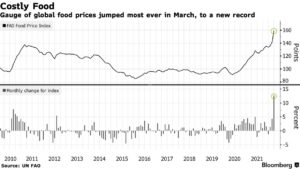Congress has quickly engaged in putting together potential aid packages for farmers that would more than double the Trump administration's $12 billion under the Farmer Bridge Assistance (FBA) Program.
World Food Prices Hit Record in March, While Ukrainian Harvest Could Fall By 20%
Reuters writer Gus Trompiz reported today that, “World food prices jumped to a new record high in March as the war in Ukraine caused turmoil in markets for staples grains and edible oils, the U.N. food agency said on Friday.
“The Food and Agriculture Organization’s (FAO) food price index, which tracks the most globally traded food commodities, averaged 159.3 points last month versus an upwardly revised 141.4 for February.
“The February figure was previously put at 140.7, which was a record at the time.”
Trompiz noted that,
The agency also cut its estimate of world wheat production in 2022 to 784 million tonnes on Friday from a forecast of 790 million last month as it factored in the possibility that at least 20% of Ukraine’s winter crop area would not be harvested.
Also today, Megan Durisin reported at Bloomberg that, “Global food prices are surging at the fastest pace ever as the war in Ukraine chokes crop supplies, piling more inflationary pain on consumers and worsening a global hunger crisis.
“The war has wreaked havoc on supply chains in the crucial Black Sea breadbasket region, upending global trade flows and fueling panic about shortages of key staples such as wheat and cooking oils. That’s sent food prices — which were already surging before the conflict started — to a record, with a United Nations’ index of world costs soaring another 13% last month.”

Durisin added that, “The FAO’s gauge of global prices has jumped about 75% since mid-2020, eclipsing levels seen in 2008 and 2011 that contributed to global food crises. Last month’s surge helped prices round out a seventh straight quarterly gain, the longest such run since 2008.
“The UN has warned that prices could still climb much more.”
Dow Jones writer Yusuf Khan reported today that, “Much of the rise has been driven from higher grain prices, with the FAO’s cereal index moving 17.1% higher month on month, mainly from the uncertainty surrounding grain exports from Russia and Ukraine. Russia and Ukraine accounted for 30% of global wheat exports and 20% of maize over the last three years, the FAO said.
“To add to the strain faced in Europe from grains, fears over American supply and crop conditions have also exacerbated the rise in prices, causing a 19.7 increase in wheat prices month-on-month.”
Meanwhile, Reuters writer Natalia Zinets reported today that, “Ukrainian Prime Minister Denys Shmyhal said on Friday this year’s grain harvest is likely to be 20% less than last year because of a reduced sowing area following Russia’s invasion.
“He said there was a shortage of fuel for farmers but Ukraine knew how to keep them supplied. He also said Ukraine had large stocks of grain, cereals and vegetable oil, and could feed its population.”
And Associated Press writer Bassem Mroue reported yesterday that, “Rising food prices as a result of the Russian invasion of Ukraine are increasing the risk of malnutrition of millions of children in the Middle East and North Africa, the U.N. children’s agency warned Thursday.”
“UNICEF warned that if the situation continues, it will severely impact children in the region, especially in Egypt, Lebanon, Libya, Sudan, Syria and Yemen, countries that were struggling with conflicts and severe economic crises even before the war in Europe began,” the AP article said.
Also this week, Reuters writer Lilian Wagdy reported that, “Iraq’s Agriculture Minister Muhammad Karim al-Khafaji said on Wednesday that Iraq has managed to secure three million tonnes of wheat, adding food security has been ensured until the end of the year.”





